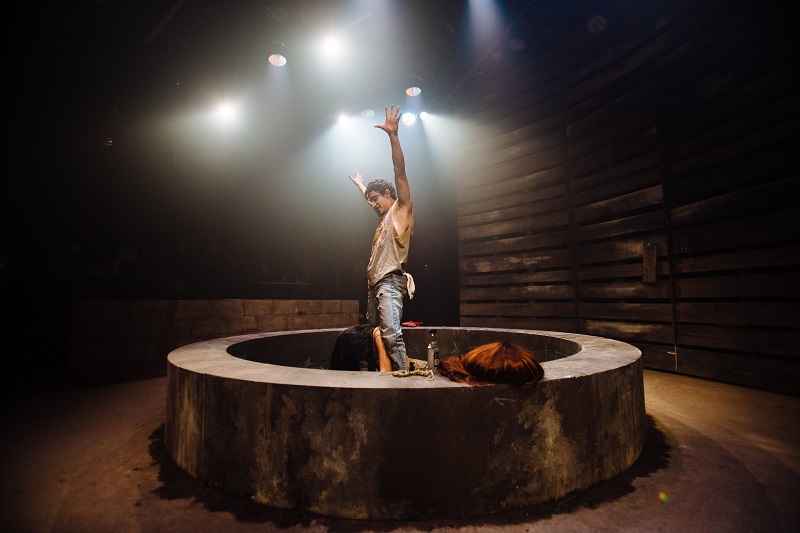
In a note in the program for Alligator, the world-premiere play opening New Georges' 25th season, Hilary Bettis describes writing it in "a fever dream of alcohol, death, violence, and poverty." Alligator, the first of a planned series of collaborations by The Sol Project with off-Broadway companies to produce new plays by Latinx playwrights, carries the audience into a similar space, embracing chaos in order to map the "pain and destruction," as Bettis's note puts it, caused by the unplanned, unpredictable intersections of people's lives. Against the backdrop of the Florida Everglades in 1999, Alligator's characters struggle, compellingly if often unsuccessfully, within and against this chaos for self-realization and human connection.
At the heart of Alligator are Ty (Dakota Granados) and his twin sister Emerald (Lindsay Rico), shortened more often than not to Em. The pair scrape by putting on gator wrestling shows for tourists. Ty does the wrestling, and Em is promoted as psychically communicating with the animals. They bill themselves as orphans, which is truth-adjacent, and while Ty learned to wrestle gators from their father, Em learned from him a less useful dependence on whiskey, which they are too poor to acquire by licit means. Soon, Ty's longtime, close friend Danny (Julian Elijah Martinez) is back for a summer visit from the University of Florida, where he plays football on a scholarship, quoting Ginsberg, bragging of his conquests, and trying to relive with Ty a showy, high-school masculinity; and Em is being offered gifts of quality whisky by Lucy (Talene Monahan), a teenaged drifter (she prefers the term "searcher") who becomes entranced by Em's performance while watching from the bushes because she has no money for admission. Meanwhile, Merick (Samuel H. Levine), a D&D devotee who enlisted in the Marines in order to win his father's respect, is trying to work out his relationship with prim Orlando transplant Dianne (Lexi Lapp) before he ships out for boot camp. The final denizen of the swamp that we meet is Rex (Bobby Moreno), but it would be a shame to spoil either his role or his wholly unexpected, truly impressive entrance.
Bettis also writes for FX's critically-acclaimed series The Americans and so is no stranger to characters who keep things hidden. As the paths of all the characters in Alligator criss-cross, secrets are inevitably brought to light, some that the secret-holders would rather forget, some that they don't want forgotten, and some that they wish they no longer had to keep locked away. Among the disappointing fathers, amid the questioning of love, trust, and morals, one of the central themes emerges, vocalized by Lucy: "How can you ever really know a person?"
Who these people are, who they were, who they pretend to be, and who they want to be all create a complex interplay, the results of which are sometimes tragic, always messy, but not always without hope. The stage is dominated by the circular gator pit that doubles as most of the play's locations, and thus, fittingly and symbolically, everyone, including some of the audience, gets wet at some point, while the water gets progressively murkier. If the alligator stands for something atavistic, for what doesn't evolve or change, then wrestling one too becomes an important metaphor, as does the continuous return to the gator pit. It is difficult to escape cycles, whether of poverty, addiction, or even adherence to social prescriptions. The play itself cycles back to Ty's opening pitch to the tourists multiple times, producing an interesting effect through shifting audience reactions. Similarly, Danny's resonant realization that the raccoons that he and Ty have treated as targets for violent amusement are in fact living beings with souls, that none of this is actually a game, is an important step, but only a step, on the wider, twistier journey that play captures. If this sounds like a lot for one play to capture, it is, but Alligator overwhelmingly succeeds by embracing its chaos rather than neatly tying things up.
The cast adds a complexity to characters who could just be Floridian stereotypes. Monahan gives Lucy just a touch of weirdness and keeps her endearing even when she is engaging in behavior that is, to say the least, problematic. Lapp and Levine give a naive gravitas to Dianne and Merick's innocence, apparent and otherwise. Moreno's role as Rex is overwhelmingly physical, but he also delivers a tour de force monologue that should make The Walking Dead's Negan jealous. Martinez as Danny and Granados as Ty both adeptly delineate the multiple facets beneath their characters' hyper-masculine personae, not least within the context of their relationship to one another. Rico is superb, and she embodies Em with a coiled intensity and power that is almost palpable. Musicians Daniel Ocanto (percussion/drums) and Graham Ulicny (guitar/synth/production), concealed much of the time behind a back wall ingeniously constructed from wooden pallets, add a sonic gritty sonic texture that is propulsive and menacing by turns.
All of these elements result in an experience with some real bite, as well as some real surprises. Often raw and visceral, but with moments also of tenderness and resolve, Alligator sinks its teeth in immediately and doesn't let go. - Leah Richard & John Ziegler
